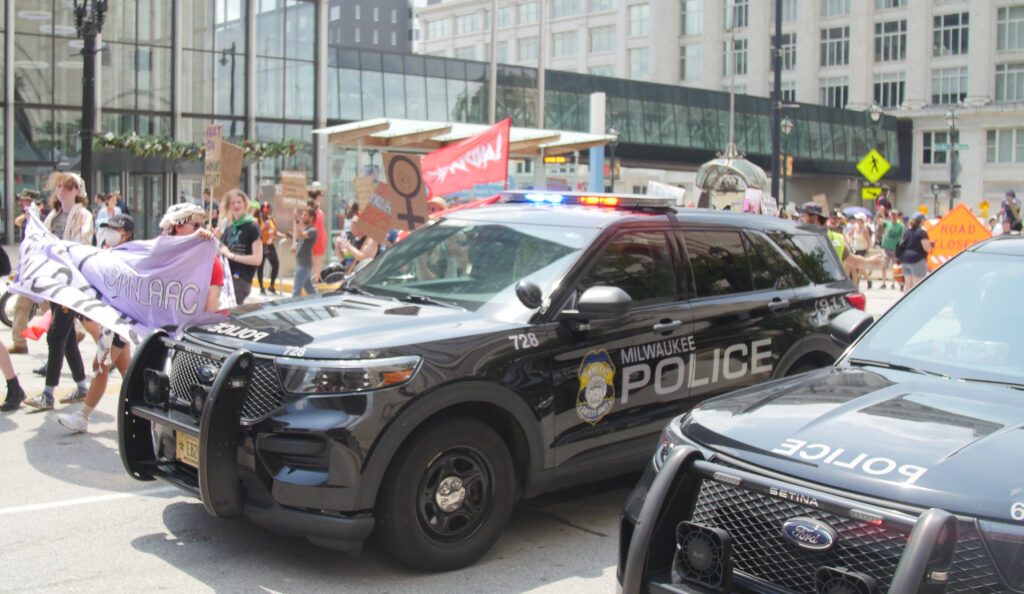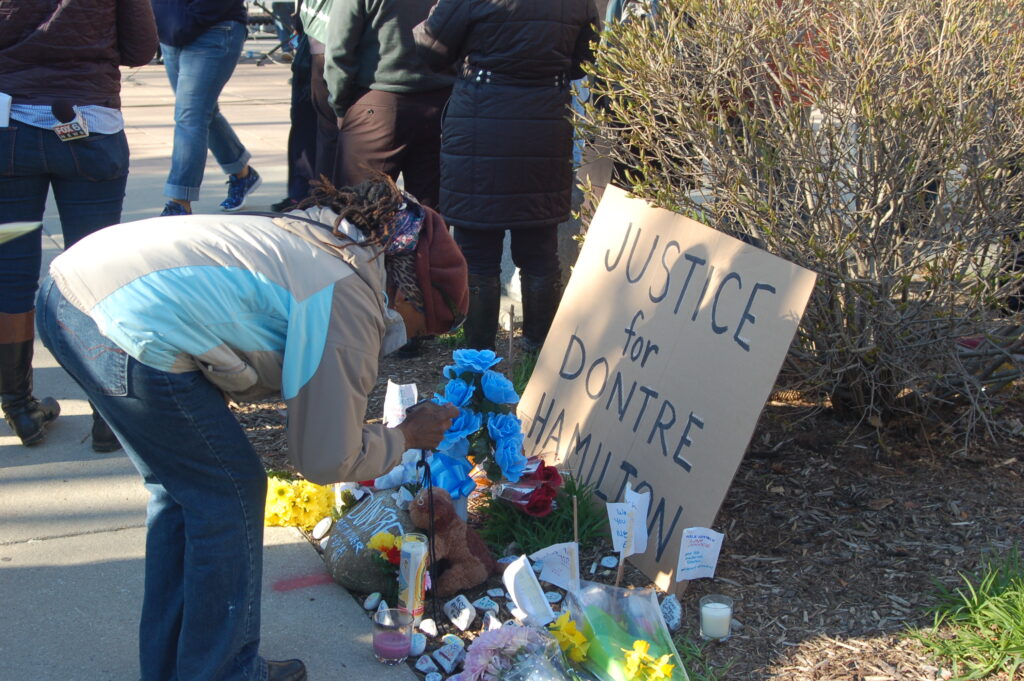MPD’s New Body Cam Release In Effect, But Advocates Still Have Concerns
Police union previously sued to stop policy's implementation.

Marchers walk past two Milwaukee Police Department vehicles on the first day of the Republican National Convention last month. During the convention, the lawsuit opposing the new video footage release policy was dropped. Photo by Devin Blake/NNS.
The Milwaukee Police Department, police union and police reformers have achieved a working consensus regarding the release of video and audio recordings in the department’s possession.
However, not all of these groups are satisfied with the policy.
Standard Operating Procedure 575 sets specific guidelines for when, why and to whom MPD must provide recordings in its possession.
If there is a recording of: an officer discharging a firearm that causes a person’s death, then MPD must make “reasonable attempts” to provide that person’s next of kin the opportunity to view or hear the recordings within 48 hours.
If there is a recording of: an officer-involved death or of a death or great bodily harm caused by a department member’s actions, occurring while in police custody or any other incident deemed “critical” by the chief of police, then MPD must release the recordings to the public within 15 days of the incident.
The policy applies to: body camera video; in-car video; audio recordings of 911 and emergency calls; other video captured by the department; video captured by other individuals or entities in the department’s possession.
Recordings may be edited, redacted or withheld to protect privacy, protect confidential information and avoid compromising investigations, the policy states.
An MPD spokesperson confirmed that the policy went into effect in July.
Relevant recordings will be released according to the policy, and other recordings requests should be made through an open records request, the spokesperson said.
Reactions from the police union
Policy decisions, including ones about the release of recordings, should be made by the police chief because they are the expert, said Alexander Ayala, president of the Milwaukee Police Association, the union representing MPD officers.
However, Ayala said he is not opposed to transparency.
Ayala recognizes that sometimes there may be an overwhelming community demand for recordings, where showing video can quell some kind of disturbance.
“I’m all for that,” Ayala said.
As far as general tweaks, Ayala said he’d be interested in discussing with Milwaukee Police Chief Jeffrey Norman the possibility of extending the timeframe for release of recordings to next of kin.
“I would just like to see maybe a couple of days more than just 48 hours,” Ayala said.
The main purpose of this change would be to ensure the integrity of investigations, he said.
Reaction from advocates of reform
Reform advocates said they do not think the needs of police outweigh the needs of the community.
The expectation is that MPD will adhere to the policy as it is now, said Alan Chavoya, the outreach chair of the Milwaukee Alliance Against Racism & Political Repression, a group that has worked alongside Hamilton and long advocated for the recordings release policy.
MPD did not respond to the question of whether Norman would consider such an extension.
‘It’s why we protested’
Hamilton said the policy is a step in the right direction.
“First and foremost, transparency is the reason that me and my family fought. It’s why we protested,” she said.

A woman leans over a makeshift memorial for Dontre Hamilton at Red Arrow Park in April of 2015, the first anniversary of his killing by a Milwaukee Police Department officer. Maria Hamilton, his mother, advocates for police reform. (NNS file photo by Andrea Waxman)
Hamilton founded the Coalition for Justice, which advocates for police reforms. She was part of the advocacy efforts that required officers who are assigned body cameras wear them at all times on duty.
Access to recordings outlined by the new policy can help victims’ families receive closure, she said.
Control over the narrative
Recordings also can help fight misleading police narratives that are amplified by the media, Hamilton said.
For example, an article published by the Milwaukee Journal Sentinel the day after the shooting said the officer initiated a pat-down of Dontre Hamilton during which “a sudden eruption of violence” took place, as stated by the then-Police Chief Edward Flynn.
However, Flynn later fired the officer for initiating a pat-down that he stated violated departmental policy.
“That first narrative, when those press conferences are done, they guide the community. The community follows,” Maria Hamilton said.
While the new policy is a step in the right direction, it’s only a step, she said.
Her goal is greater community control over police hiring, training and discipline.
“For me, we just need to do our due diligence and continue to move forward,” she said.
Devin Blake is the criminal justice reporter for the Milwaukee Neighborhood News Service. His position is funded by the Public Welfare Foundation, which plays no role in editorial decisions in the NNS newsroom.
As MPD implements a new video and audio release policy, concerns remain was originally published by the Milwaukee Neighborhood News Service.
If you think stories like this are important, become a member of Urban Milwaukee and help support real, independent journalism. Plus you get some cool added benefits.





















